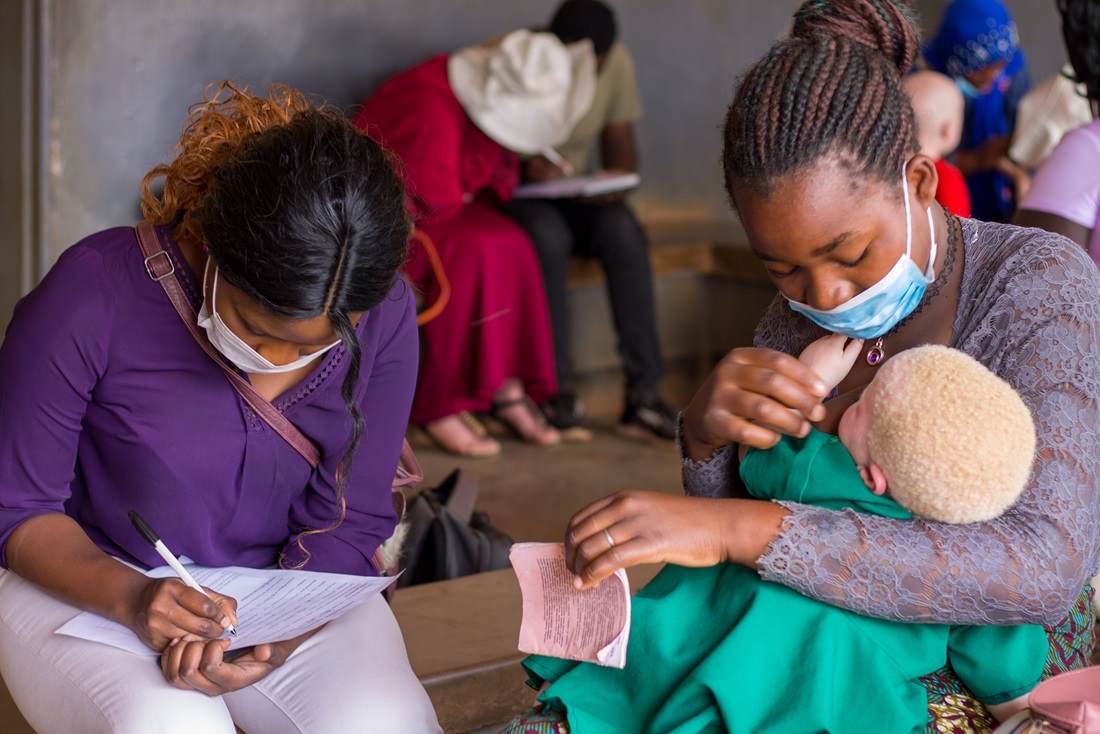
Beyond Suncare
Protection against skin cancer for people with albinism in Uganda
Improve access to healthcare
Africa and Middle East
2022-2023
UN Sustainable Development Goals



The issue
Albinism is a poorly understood condition in many communities in sub-Saharan Africa.
It’s a genetic condition, that affects the production of melanin – the pigment that colours skin, hair and eyes.
People with albinism have a reduced amount of melanin, or no melanin at all. This can cause problems with eyesight, pale skin that burns easily and people with albinism often have white or very light blonde hair, although some have brown or ginger hair. It’s a lifelong condition, but doesn’t get worse over time.
People living with albinism are found in every country. In the US, around one in 20,000 have albinism, while the figure is generally believed to be around one in 1,500 in Tanzania, and between one in 5,000 - 15,000 in other parts of Africa.
In sub-Saharan Africa, there are 200,000 people with albinism - yet they have no access to education about the importance of protecting themselves from the sun. In addition to being discriminated against for their appearance and persecuted by the influence of violent superstitions, the main cause of their extreme vulnerability is the sun. Skin cancer ends the life of nine out of ten people with albinism before reaching the age of 30.
Their situation most often condemns them to extreme poverty, forcing them to make a living with outdoor work, exposed for long hours to the intense tropical sun.
The problem is made worse because the majority of health institutions do not educate on skincare when exposed to the sun, nor do they offer advice to families that have given birth to a child with albinism. Albinism is not included in health education programs, which causes a total absence of information about the condition among communities.
There is very poor access to sun creams – often it is distributed only through centralised referral hospitals to which only privileged people have access.
In general, the creams available in the region are often of low quality and their delivery is not accompanied by education. Travel to collect sun creams can in volve long journeys and be expensive, or dangerous – and sometimes ineffective when there are no stocks left.
Beyond Suncare
For more than 10 years, Beyond Suncare has been working to ensure all people with albinism live a free and dignified life, protected against skin cancer and discrimination.
The charity exists to ensure that every person with albinism can enjoy the same opportunities as those who don’t have the condition and that they can live without fear.
Beyond Suncare works with local communities to design innovative and sustainable solutions to change the lives of people with albinism, especially those at a higher risk of exclusion, and their service model has been declared Best Practice by the United Nations.
It believes that with awareness and education about the importance of sun protection, no person with albinism should die because of their condition.
Beyond Suncare have created the “Beyond Protection Package” which includes elements such as locally produced customised creams with free distribution ensuring the most rural places are catered for. Educating communities, family members, health professionals and local authorities on the genetic condition is another key element of the package. They also bring together organisations and professionals from different fields to achieve sustainable solutions.
Find out more about Beyond Suncare on their website

The project
Croda Foundation has awarded a grant of £30,000 to Beyond Suncare for a project supporting people with albinism in Uganda.
Vulnerable to discrimination and very early death from skin cancer, people with albinism are among the most marginalised in Uganda. Yet they remain largely overlooked by government and civil society.
The grant from Croda Foundation will fund a project that seeks to reduce the risk of skin cancer for 500 people with albinism living in Bugisu sub-region - a mountainous, hard-to-reach area hit by chronic poverty, where there is very little understanding about albinism.
The project will train 90 health workers on albinism and skin cancer prevention, building knowledge about albinism amongst those that have the genetic condition and their caregivers, promoting self-care measures, increasing the usage of sun-protective materials, and referring skin cancer cases.
At a wider level, the project aims to produce a model which can be replicated throughout Uganda to ensure people with albinism have access to the right support and care. There are also plans to look at how people currently access sunscreens across the country – aiming to use data to demonstrate the potential need for local production of high quality and affordable sunscreens.
Improved health and promoted social inclusion in Uganda will result from educating those who have the genetic disorder and their communities. Health workers will receive training and resources to provide skin clinics, cryotherapy and reliable supplies of tailored SPF50 sunscreen to prevent skin cancer.
Impact
90 health workers are trained to support regular skin cancer screening
Nine district clinics will supply customised sunscreen lotions every four months to PWA
Croda Foundation, established in 2020, is an independent charitable company set up by FTSE 100 specialty chemicals company, Croda International Plc, and is registered in England and Wales (number: 1196455). The Foundation is solely funded by generous donations from Croda International Plc and led by an independent Board of Trustees.


